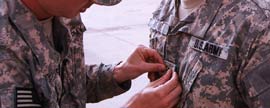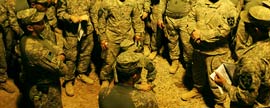Have you ever heard an NCO or officer make the statement “That’s NCO business”? What exactly does that mean? NCOs and officers have their own respective areas of authority. This article is about the difference between NCO business, officer business, and Leader Business.
Generally speaking, officers are usually concerned with the collective tasks and the strategic view of the organization while NCOs typically handle individual tasks and the daily business of getting things done. There are some big differences here, but the truth of the matter is that officers and NCOs have a larger list of shared duties and responsibilities than exclusive ones. This large list of shared responsibilities means they have a common goal to ensure mission accomplishment while ensuring the health & welfare of their Soldiers. This common goal cannot be adequately achieved by dividing roles into NCO and officer business.
Problems with “NCO business”
And that, my fellow leader, is why I have a problem with the term “NCO business.” The NCO who uses the term is likely caught up in their egotistical fantasies about their ability to lead. This is the NCO who says things like “the boss wouldn’t understand.” Also possible, this NCO may lack the skills and confidence necessary to build a strong team. Division of labor is an important part of teamwork, but cutting half of your leadership team out of a situation could be crippling.
On the other hand, the officer who uses this phrase is usually implying that certain tasks are beneath him. “Time to get our hands dirty? Oh no, that’s NCO business.” It can also be used in a dismissive way. These leaders sometimes lack a sincere concern for the Soldiers they lead.
I admit that these are stereotypical comments, but they tend to capture both sides of the issue. These are cancerous attitudes and they do not make a good recipe for mission success.
Working together for a solution
Officers and NCOs are members of a team and, as such, must work together for the overall success of the team. This includes sharing knowledge, keeping each other informed, and finding practical solutions to problems. This can only be achieved through a common vision of teamwork. For example, the relationship between the Sergeant and the LT needs to be tight. The Soldiers need to know their LT and Sergeant are tight and will do whatever it takes to achieve mission success and look out for their welfare. While the LT may be out gathering resources, understanding the mission and how it relates to the next higher element, the Sergeant is conducting pre-combat and pre-execution checks while verifying the Soldiers are ready to go. The LT and Sergeant must fully understand their specific roles, duties, and responsibility and how they are intertwined. Once this is the case, the entire team will see and understand. When this concept is fully understood by all members of the unit, the results are contagious and Soldiers become motivated to ensure success and take care of each other.
When the organization reaches this level of performance it is a result of Leader Business. No back biting, undermining of authority, or snide comments. Each member of the team fully trusts their leaders and knows that their leaders are a strong team.
I submit to you that organizations operating under the shared principle of Leader Business are far more competent and capable than those that operate under segregated duties and responsibilities.
The next time you hear someone say “That’s NCO business”, examine the individual, the tone, and the organization. You may be surprised by what is revealed during this examination. Is it NCO business or Leader Business? It’s your call. Are you a building a team or building a following?
















